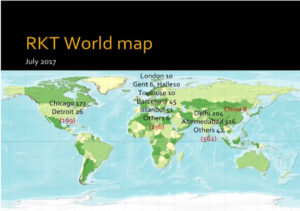Highlights
Highlights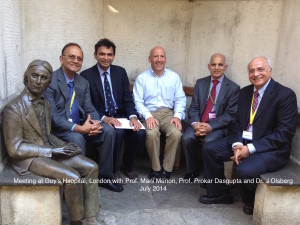
A Leader & Teacher
- Unique feat of starting and leading 5 successful and prestigious Urology and Renal Transplantation Programs in India at Sanjay Gandhi Post-Graduate Institute of Medical Sciences (SGPGIMS), Lucknow in 1989, at Apollo Hospital, New Delhi in 1997, Fortis Hospital New Delhi in 2007, at Medanta, the Medicity in year 2010, and at Fortis Escorts Heart Institute in 2016.
- Initiated Urology training programs at all Institutions of affiliation, M.Ch. Urology at SGPGIMS, Lucknow, and Diplomat National Board (DNB) Urology training program at Apollo Hospital, New Delhi, Fortis Hospital New Delhi and at Medanta, the Medicity.
- Conducting 1-year Post Urology training Fellowship courses in Minimally invasive Urology and Renal Transplantation at since 2011.
- Training one Vattikuti Fellowin Minimally Invasive Urologysince 2012.
Expertise in Endo-Urology for upper tract
- Board of Directors (BODs), Endourological Society,elected member from 2009 to 2012.
- Started first comprehensive stone center and Endo-urology program (PCNL, Ureteroscopy, lithotripsy, X-ray diffraction stone analysis) in 1989, while a Faculty member at SGPGIMS, performing both percutaneous access and the procedure.
- Worked with Mike Kellett and Hugh Whitfield, leaders in Endourology, during the Institute of Urology Nephrology stint at London, UK during 1995-96.
- Performed more than 3000 percutaneous nephrolithotomy (PCNL) since 1990.
- Invited as faculty to almost all National and International Percutaneous Surgery Workshops being held in the country.
- Performing PCNL in Camp settings, more than ten such procedures in a single day, since 1998, such camps being held at Jammu, India every 4 to 6 weeks.
Expertise in Minimally invasive (Laparoscopic and Robotic) Urology
- Live demonstrations of full spectrum of all complex laparoscopic reconstructive and Oncologic procedures(during live workshops), like Pyeloplasty, Partial Nephrectomy, Radical Cystectomy and Radical Prostatectomy at live laparoscopic Urology workshops in India.
- First in India to initiate regular Laparoscopic Donor nephrectomy program in 1999, Minimally invasive Prostatectomy program in 2004 and Partial Nephrectomy program in 2007.
- Faculty at Worldwide Robotic Surgery 24 hour event since 2015 (http://wrse24.org/broadcasts/new-delhi/) organised by Karolinska Institute for EAU as one of eight robotic surgery center from four continents to demonstrate live robotic renal transplantation from Medanta, India. The selected eight centers were Karolinska (Peter Wiklund, Abolfazl Hosseini), Aalst Belgium (Alex Mottrei), Guys London (Prokar Dasgupta), Verona in Italy (Walter Artibani), New York (Ash Tewari), Florida (Vip Patel), Los Angeles (Indy Gill), Seoul (Koon Rha), New Delhi (Rajesh Ahlawat), and Melbourne (Declan Murphy).
- Invited to perform live Robotic Renal Transplantation at International events, having demonstrated the technique at Detroit (USA), Bilbao (Spain), Rome (Italy), Barcelona (Spain), Istanbul (Turkey) and Ghent (Belgium).
- Has been visited by various surgical teams from US, Europe and Asia to observe and learn his Robotic Renal Transplantationtechnique.
Expertise in Renal Transplantation
- Having performed more than 300 live related renal Transplantations during one calendar year, one of very few such centers in the world.
- Initiated India’s first Laparoscopic Donor Nephrectomy (LDN) program,at Apollo Hospital, New Delhi in 1999, and have one of the largest experience of LDNs.
- Started the world-leading program of Robotic Recipient surgeryunder regional hypothermia in 2013 using intra-corporeal hypothermia.
- Helped initiate and establish Renal Transplantation program at four different Institutions in India, at Sanjay Gandhi PGI, Lucknow during early 1990s, at Apollo Hospital, New Delhi in 1997, Fortis Hospital New Delhi in 2007, and at Medanta, the Medicity in year 2010.
- Renal Transplantation program, vascular access and Cadaver harvesting as Honorary Lecturer at Institute of Urology and Nephrology London, UK in 1985-1986, North Thames region, UK.
- Unique feat of starting and leading 5 successful and prestigious Urology and Renal Transplantation Programs in India at Sanjay Gandhi Post-Graduate Institute of Medical Sciences (SGPGIMS), Lucknow in 1989, at Apollo Hospital, New Delhi in 1997, Fortis Hospital New Delhi in 2007, at Medanta, the Medicity in year 2010, and at Fortis Escorts Heart Institute in 2016.
- Initiated Urology training programs at all Institutions of affiliation, M.Ch. Urology at SGPGIMS, Lucknow, and Diplomat National Board (DNB) Urology training program at Apollo Hospital, New Delhi, Fortis Hospital New Delhi and at Medanta, the Medicity.
- Conducting 1-year Post Urology training Fellowship courses in Minimally invasive Urology and Renal Transplantation at since 2011.
- Training one Vattikuti Fellowin Minimally Invasive Urologysince 2012.
Expertise in Endo-Urology for upper tract
- Board of Directors (BODs), Endourological Society,elected member from 2009 to 2012.
- Started first comprehensive stone center and Endo-urology program (PCNL, Ureteroscopy, lithotripsy, X-ray diffraction stone analysis) in 1989, while a Faculty member at SGPGIMS, performing both percutaneous access and the procedure.
- Worked with Mike Kellett and Hugh Whitfield, leaders in Endourology, during the Institute of Urology Nephrology stint at London, UK during 1995-96.
- Performed more than 3000 percutaneous nephrolithotomy (PCNL) since 1990.
- Invited as faculty to almost all National and International Percutaneous Surgery Workshops being held in the country.
- Performing PCNL in Camp settings, more than ten such procedures in a single day, since 1998, such camps being held at Jammu, India every 4 to 6 weeks.
Expertise in Minimally invasive (Laparoscopic and Robotic) Urology
- Live demonstrations of full spectrum of all complex laparoscopic reconstructive and Oncologic procedures(during live workshops), like Pyeloplasty, Partial Nephrectomy, Radical Cystectomy and Radical Prostatectomy at live laparoscopic Urology workshops in India.
- First in India to initiate regular Laparoscopic Donor nephrectomy program in 1999, Minimally invasive Prostatectomy program in 2004 and Partial Nephrectomy program in 2007.
- Faculty at Worldwide Robotic Surgery 24 hour event since 2015 (http://wrse24.org/broadcasts/new-delhi/) organised by Karolinska Institute for EAU as one of eight robotic surgery center from four continents to demonstrate live robotic renal transplantation from Medanta, India. The selected eight centers were Karolinska (Peter Wiklund, Abolfazl Hosseini), Aalst Belgium (Alex Mottrei), Guys London (Prokar Dasgupta), Verona in Italy (Walter Artibani), New York (Ash Tewari), Florida (Vip Patel), Los Angeles (Indy Gill), Seoul (Koon Rha), New Delhi (Rajesh Ahlawat), and Melbourne (Declan Murphy).
- Invited to perform live Robotic Renal Transplantation at International events, having demonstrated the technique at Detroit (USA), Bilbao (Spain), Rome (Italy), Barcelona (Spain), Istanbul (Turkey) and Ghent (Belgium).
- Has been visited by various surgical teams from US, Europe and Asia to observe and learn his Robotic Renal Transplantationtechnique.
Expertise in Renal Transplantation
- Having performed more than 300 live related renal Transplantations during one calendar year, one of very few such centers in the world.
- Initiated India’s first Laparoscopic Donor Nephrectomy (LDN) program,at Apollo Hospital, New Delhi in 1999, and have one of the largest experience of LDNs.
- Started the world-leading program of Robotic Recipient surgeryunder regional hypothermia in 2013 using intra-corporeal hypothermia.
- Helped initiate and establish Renal Transplantation program at four different Institutions in India, at Sanjay Gandhi PGI, Lucknow during early 1990s, at Apollo Hospital, New Delhi in 1997, Fortis Hospital New Delhi in 2007, and at Medanta, the Medicity in year 2010.
- Renal Transplantation program, vascular access and Cadaver harvesting as Honorary Lecturer at Institute of Urology and Nephrology London, UK in 1985-1986, North Thames region, UK.
Pioneering and disseminating Robotic Renal Transplantation under regional Hypothermia
The Background
Renal Transplantation has been traditionally performed by open surgical method, almost unchanged since last 60 years. Patients requiring kidney transplant are prone to infections, and are in frail health. There are surgical complications following open surgery, like wound infection and collections. Theoretically, a Minimally Invasive Kidney Transplant (MIKT), laparoscopic or robotic, would avoid open cutting incision, reduce complications and speed recovery, as has been proved in every other surgical field so far. Attempts at laparoscopic KT met with limited success due to limited range of movements with laparoscopic instruments and non-uniform and non-standardized approaches. In initial attempts with the robot it was observed that there is slower recovery of kidney function during such attempts, which could be attributed to re-warm ischemia during anastomosis, with no attempt to keep the transplanted organ at desired lower temperature during surgery.
Idea of Robotic Kidney Transplantation (RKT) with hypothermia (maintaining low temperature of the organ during procedure) was conceived in 2012 as a collaborative effort of Vattikuti Urology Institute (VUI), Henry Ford Hospital, Detroit with Medanta team in India. There were only two case reports of Robotic Renal Transplantation in literature at that time. The technique for RKT was planned, developed and mastered using IDEAL guidelines. Preclinical initial laboratory studies on fresh cadavers were done at Ohio State University, Columbus, Ohio, USA. Dr. Ahlawat and VUI team conducted successful phase 1 clinical trial of RKT with regional hypothermia, the first world over in Jan 2013 in India after the necessary Institute Review Board and Ethical Committee clearances. Results were published in literature, and the technique demonstrated and expanded around the world..
Acceptance of RKT technique around the world
a. Publications in high index journals
b. Presentation and enthusiasm at International meetings
c. Invitations for live surgery demonstrations around the world
d. Visits by International teams to watch cases being performed live
e. Inclusion of the technique in text books
A. Publications in high index journals
The initial data acquisition and its analysis was done by independent observer from VUI, Detroit, USA staying in India with the operating team. The results were peer reviewed and accepted by the scientific community world over. Initial results were analyzed and reported in 2014-2015 in international publications in high impact journals (Eur Urology). Articles from European Urology were notice and commented upon in Urological Surveysection (Laparoscopy/new technology`) of Journal of Urology.
B. Presentation at International meetings
EUROPEAN ASSOCIATION OF UROLOGY (EAU 2014): Results and the technique were presented at 2014 European Urology Meeting at Stockholm.A 3-D video was also requested and shown at “Surgery in Motion”section of the same meeting. The presentation won the best poster award at 2014 European Urology Meeting at Stockholm.
AMERICAN UROLOGICAL ASSOCIATION(AUA 2014): There were various presentations on the technique, its monitoring and the outcomes at 2014 American Urological Association Meeting at Orlando. Robotic Renal Transplantation with regional hypothermia was part of take home message, both in Robotic surgery and Transplantation sections, at conclusion of the meeting (AUA Take Home Messages 2014).
WORLD CONGRESS OF TRANSPLANTATION2014: A podium presentation at World Congress of Transplantation at San Francisco in July 2014 was one of the best chosen presentation, and led to an invited publication in “Transplantation”journal.
Invitations at International Meetings on RKT:
- Urological Association of Asia (UAA) lecture on “Minimally Invasive Renal Transplant surgery: the success story of harvest to humble beginning of grafting”at Société Internationale d’ Urologie (SIU) meeting at Vancouver, September 2013.
- “Robotic Renal Transplantation: Has it arrived?”at Urology beyond Europe: Joint session of EAU and USI, at European Association of Urology (EAU) meeting, 1320-1340, March 20, Madrid, March 2015.
- “Robotic Renal Transplantation“at Joint ERUS and ESUT session at European Association of Urology (EAU) meeting, 1245-1255, March 21, Madrid, March 2015.
- “Role of Robotic surgery in Renal Transplantation“, a plenary state of art lecture at American Urological Association (AUA) at New Orleans, May 2015. http://www.aua2015.org/webcasts/webcast_play.cfm?videoID=1990&agendaid=7629
- “Robotic Renal Transplantation: Evolution” and “Robotic assisted Laparoscopic Donor Nephrectomy”at 2nd International Translational Research Uro-Sciences Team (iTRUST)in Rome, Italy, Sep 2015.
- “Robotic Renal transplantation: The technique”at “International Live Operative Workshop on Advanced Robotic and Reconstructive Surgery” at PGIMER, Chandigarh, Feb 2016.
- “Debate: Is Robotic Assisted Renal Transplantation the future”at Munich, EAU 2016, Mar 2016. Webcast here.
- “Robot-assisted renal transplantation: is it ready for prime time?”at Robotic Surgery masterclass at Urological Association of Asia (UAA) meeting at Singapore, Jul 2016.
- Invitation to European Association of Urology (EAU) 2017 London meetingparticipate in Thematic session 13: Kidney transplant and reconstructive surgery as a Panelist, London, Mar 2017.
- “Robotic kidney transplantation”,Session:Transplantation, Aug 4, 10.45-12.30, at Urological Association of Asia (UAA) meeting at Hong Kong, Aug 2017.
- Invitation by Société Internationale d’Urologie (SIU) Scientific committee at 37thSIU 2017 meeting at Lisbon for organizing an “Instructional course on Kidney Transplantation”, Lisbon, Sunday 1415 to 1545, Oct 22, 2017.
- Surgical Masters Videos session to present Robotic Kidney Transplant, Invite to 38th Congress of the Société Internationale d’Urologie (SIU), to be held October 4-7, 2018 in Seoul, South Korea, Oct 2018 (accepted).
C. Invitations for live surgery demonstrations around the world
Invited as Faculty for live surgical demonstrationof technique of Robotic Renal Transplantation at International meetings and platform.
- 1st Worldwide Robotic Surgery 24hour event2015 (WRSE) http://wrse24.orgto demonstrate Robotic Kidney Transplantation,Feb 2015. http://wrse24.org/broadcasts/new-delhi/
- Invited to perform live Robotic Renal Transplantation under hypothermia at ERUS 2015. Bilbao, Spain, Sep 2015.
- 2nd International Translational Research Uro-Sciences Team (iTRUST)to perform live Robotic Renal Transplantation under hypothermia, Rome, Italy, Sep 2015.
- Invited faculty at 54th Fundació Puigvert Urology Courseto perform live Robotic Renal transplantation, Barcelona, Spain,Oct 2015.
- Bakirkoy Dr. Sadi Konuk Training and Research Hospital to start their Robotic Transplant program. Three successful cases of Robotic Renal Transplant cases were performed from live donor over 2 days, Istanbul, Turkey, Dec 2015.
- “International Live Operative Workshop on Advanced Robotic and Reconstructive Surgery” to perform live Robotic Renal transplantationat PGIMER, Chandigarh, India, Feb 2016.
- Universitair Ziekenhuis to perform live Robotic Renal transplantation at their centre to start their RKT program, Gent, Belgium, Mar 2016.
- “International Live Operative Workshop on Robotic Assisted Urological Surgery”at Max Super Specialty Hospital, to perform live robotic renal transplantation. Other operating faculty being Peter Wiklund from Karolinska and Nikhil Vasudeo from UK. Delhi, India, April 2016.
- Invited at Bakirkoy Dr. Sadi Konuk Training and Research Hospital, to demonstrate Robotic Renal Transplantation, Istanbul, Turkey, Oct 2016.
- Live broadcast of Robotic Kidney transplant at WRSE 24 platform http://wrse24.org, Nov 15, 2016.
- Live demonstration of two cases at Manipal Hospital, Bangaloreto kick start Robotic Kidney Transplant at their center, Bangalore, India, Nov 2016.
- Invited to mentor two cases of Robotic Renal transplantation at to Royal Free London Hospital, London, Dec 2016.
- Worldwide live broadcast of Robotic Kidney transplant at WRSE 24 http://wrse24.orgplatform, Jun 16, 2017.
- Invitation to broadcast a live Robotic renal transplant case for Society of Robotic Surgeons (SRS 2018, https://sors.memberclicks.net/meetings. The SRS is a multi-specialty event) meeting, Stockholm,June 19, 2018.
- Invitation as faculty to 6th Meeting of the EAU Section of Uro-Technology (ESUT) in conjunction with the Italian Endourological Association (IEA), to transmit a live case in May, 2018, with the title “Robotic kidney transplant”, Modena, Italy, May 24to 26, 2018.
- Worldwide live broadcast “Robotic Assisted Partial Nephrectomy” at WRSE 24 https://4healthtv.play.livearena.com/Vod/a3d2bcc2947347bea2316fa858e2ab7d on Jan 28, 2019.
D. Visits by International teams to watch RKT cases being performed live
- Yoshida and Kimfrom Henry Ford Hospital transplant Unit visited Medanta to observe Robotic Renal Transplants in March 2014. Three successful such cases have, subsequently, been performed during May 2014 by the transplant team at Henry Ford Hospital, USA, led by Dr. Ahlawat.
- Ernesto P. Molmenti, Vice Chairman and Transplant Surgeon at North Shore University Hospital, NY visited Medanta in June 2014 with his team to observe the technique.
- Jonathan Olsburgh and Dr Nizamfrom Guys Hospital, London visited Medanta with their other team members in November 2014.
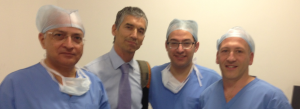
- Alberto Breda, MD, Chief of the Kidney Transplant Surgical Team, Consultant in Oncologic Urology and Minimally Invasive Surgery, and Dr L. Gausafrom Department of Urology, Fundació Puigvert, Barcelona, Spain visited Medanta in June 2015 to observe the technique.
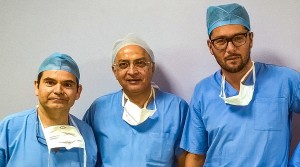
- Antonio Alcaraz, chairman and professor at University of Barcelona visited Medanta in June 2015 to observe the technique.
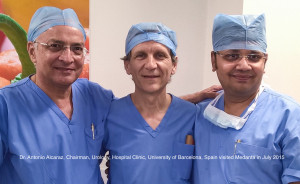
- Puneet Sindhwani, Director, Renal Transplantation visited in May 2015 to observe Robotic Renal transplantation from Oklahama Health Sciences Center, USA.
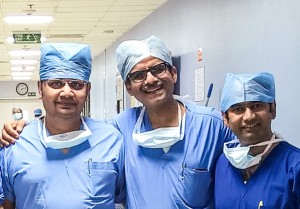
- Dr Volkan Tugcu with his team from Bakirkoy Dr. Sadi Konuk Hospital, Istanbul, Turkey visited Dr. Ahlawat in Nov 2015 to observe Robotic Renal Transplantation.
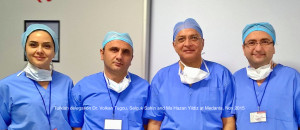
- Neal Banga and Ravi Barod from Royal Free London Hospital visited Dr Ahlawat in Nov 2016 to observe Robotic Renal Transplantation.
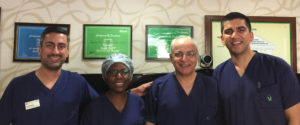
- G Siena from Italy, andDr Sananda Bag and Dr Suri Babufrom Yashoda Hospital, Secundrabad observed Robotic Kidney Transplantation in Nov 2017.
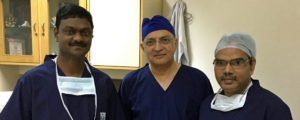
- Chinese delegations of transplant surgeons visited Dr. Ahlawat in Sep. 2015, Mar 2016 and Jan 2017 to observe the technique.

E. Inclusion of the technique in text books
Chapter on Robotic Renal Transplantation (RKT) has been included in text books
- Robotic Renal Transplantation, Rajesh Ahlawat, Sohrab Arora, Mani Menon. in Smith’s Text Book of Endourology 2016. Robotic Renal Transplantation. Chapter · December 2016. In book: Smith’s Text Book of Endourology, Publisher: Wiley, Editors: Arthur D. Smith.
- Robot Assisted Renal Transplantation, ChapterJanuary 2017, DOI: 10.1007/978-3-319-33231-4_60, In book: Operative Atlas of Laparoscopic and Robotic Reconstructive Urology, pp.639-648
- Complications of Robotic Renal Transplantation. Rajesh Ahlawat, Sohrab Arora. In Complications in Robotic Urologic Surgery Edited by René Sotelo, Monish Aron, Juan Arriaga. Springer, 2016
- Robotic Kidney Transplantation: Present and future perspectives. Rajesh Ahlawat, Sohrab Arora, Mani Menon. In ESTU Text Book on Kidney Transplantation. Ed. Enrique Lledó-Garcia, 2016
- Minimally invasive renal recipient surgery in Bishoff & Kavoussi: Atlas of Laparoscopic Urologic Surgery 3rd Ed, (Publisher Elsivier),
- Robotic renal Transplantaion under regional hypothermia, video in Campbell-Walsh Urology, Elsevier Science Health Science div, 2014.
- Minimally Invasive Kidney Transplantation, in Molmenti E (Ed.), pages 205-14. Atlas of transplantation, 2014
Present status of RKT
Robotic Renal Transplantation has shown the potential to become the standard of care world over. Approximately one thousand cases of Robotic Renal transplantation have been done around the world since Jan 2013 till Jul 2017. The world map of these cases in Jul 2017 is given here.
